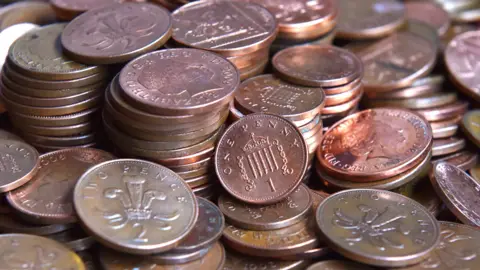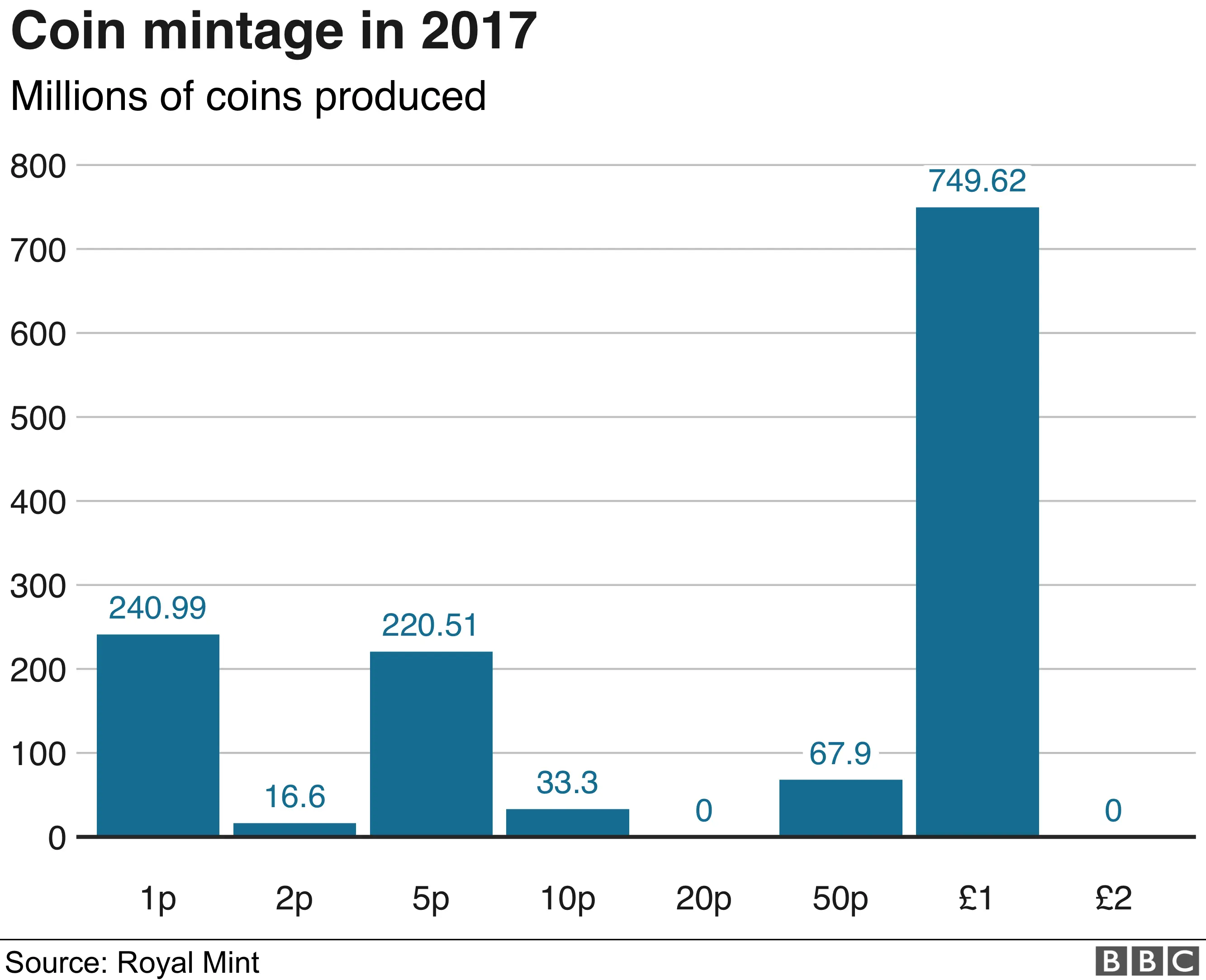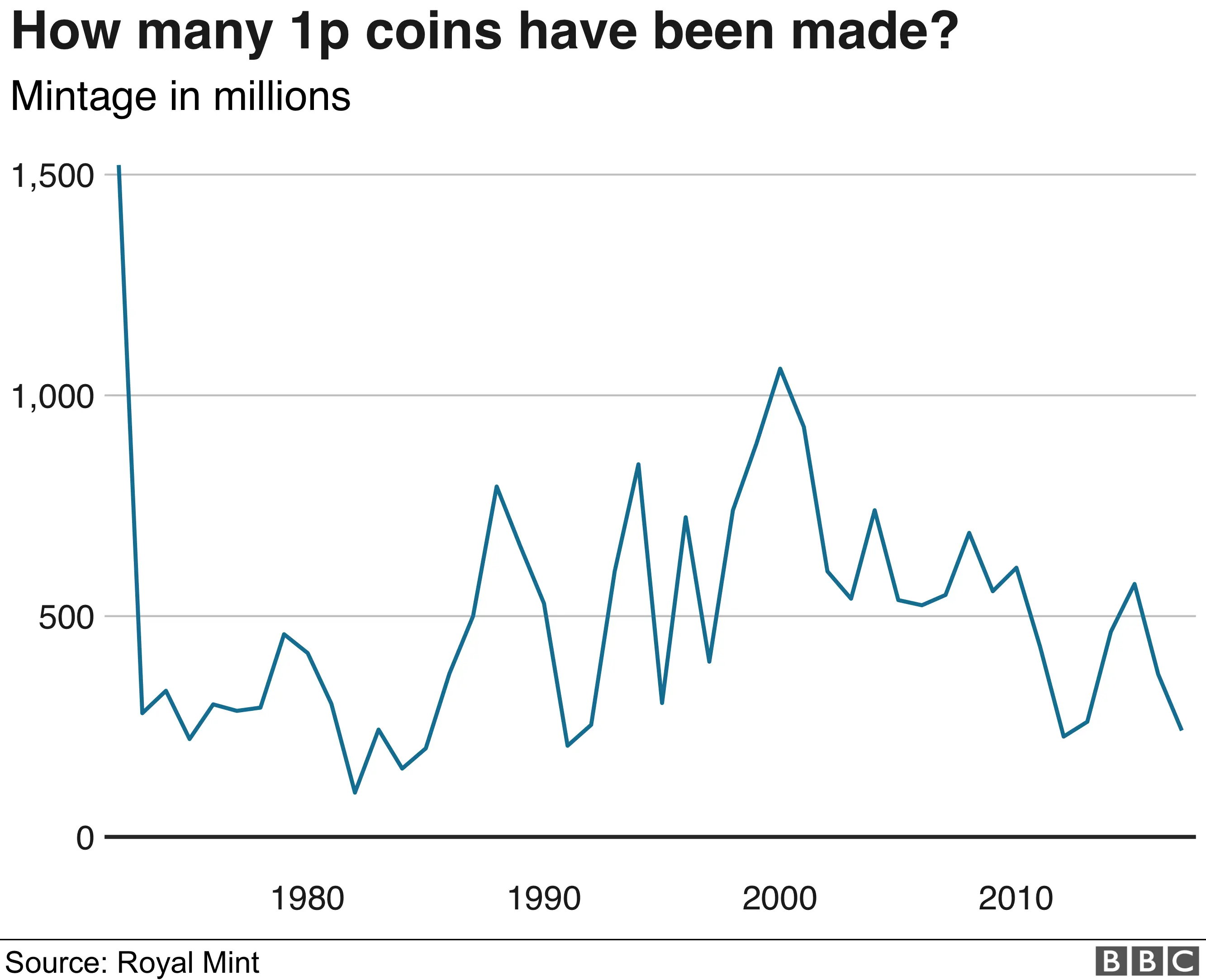Future of 1p and 2p coins secured 'for years to come'
 Getty Images
Getty ImagesThe UK Treasury has reprieved 1p and 2p coins, saying they will continue to be used "for years to come".
The copper coins were theoretically under threat when Chancellor Philip Hammond consulted on the current mix of coins and banknotes in circulation.
The chancellor has now said he wants people to "have a choice" over how they spend their money.
He has also set up a group to oversee the cash system, ensuring everyone can get hold of their money in cash.
The Treasury has estimated that 2.2 million people in the UK are reliant on cash, particularly the elderly, vulnerable, and those living in rural areas.
An independent review of cash published in March suggested that banknotes and coins were a necessity for eight million people.
Why were these coins under threat?
Cash use has been falling dramatically in recent years. In 2017, debit card use - driven by contactless payments - overtook the number of payments made in cash in the UK for the first time.
However, there were still nearly 241 million 1p coins minted that year and nearly 17 million 2p coins produced.

Surveys have suggested six in 10 of UK 1p and 2p coins are only used once before being put in a jar or discarded, while one in 12 is thrown into a bin. The rising cost of living has also eaten away at their value. In effect, the 1p coin is now worth less than the halfpenny when it was abolished in 1984.
In his Spring Statement in 2018, the chancellor's call for views on the mix of notes and coins appeared to pave the way for the end of 1p and 2p coins, as well as the future of £50 notes, once described as the "currency of corrupt elites, of crime of all sorts and of tax evasion".
A swift reverse by the Prime Minister's official spokesman declared there were no plans to scrap the copper coins. A later announcement of a plastic redesign for the £50 note also confirmed the survival of the Bank of England's highest value note.
However, the consultation continued, with the government's final view unknown until now.
Why the reprieve?
Many countries - including Canada, the home of the current Bank of England governor Mark Carney - have ditched a denomination coin. Australia, Brazil, and Sweden are among many others to do so.
However, the chancellor was accused of being a "penny pincher" by opposition parties when the consultation on the UK's mix of coins was launched, prompting 10 Downing Street's intervention.

Mr Hammond said that the decision to leave the current mix of notes and coins unchanged was a matter of public freedom.
"It is clear that many people still rely on cash and I want the public to have a choice over how they spend the money," he said.
The decision was welcomed by the trade body for small businesses, which has consistently called for the status quo.
"Keeping 1p and 2p coins in circulation is the right call," said Mike Cherry, national chairman of the Federation for Small Businesses.
"The freedom to use pennies is still important to a lot of small firms. For many, being able to charge prices that end in 99p rather than a round pound figure can be enough to tip intrigue into a sale, particularly where lower-value items are concerned."
What about the wider future for cash?
The future of pennies clouded the bigger picture of the future of cash in general, according to former financial ombudsman Natalie Ceeney, the author of the Access to Cash Review.
"The issue is not 1p and 2p coins," she said. "The issue is whether cash is going to stay viable."
She said that by chipping away at the mix of coins, the government would have been giving the impression that it did not care about cash.
Instead she said that the announcement of a government-led group to support access and help safeguard cash for those who needed it was "a clear statement of intent", and "a good start" in ensuring the UK did not sleepwalk into a cashless society.
She said her focus was on the 20% of people who would be left behind without cash, and she still wanted a clear commitment from regulators that they had the same focus.
The Emerging Payments Association, which represents financial technology companies (Fintechs), argued that more needed to be done to ensure the nation's most vulnerable were given the education and guidance to allow them to have the chance to use mainstream digital services, rather than having to rely on cash.
